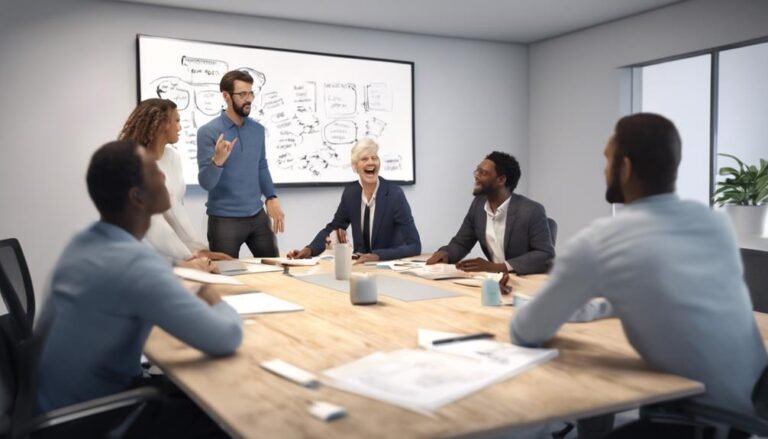Listening as a Soft Skill
Enhancing your listening skills is crucial for effective communication and relationship building. Active listening enhances understanding, empathy, and trust, fostering better problem-solving. Techniques like maintaining eye contact, asking questions, and using nonverbal cues improve your ability to connect with others. Overcoming barriers such as mental distractions leads to clearer communication. Showing empathy and using reflective listening deepen connections. Investing in your listening skills pays off in various aspects of life. The more you engage with different techniques, the better you'll become at listening and understanding others.
Key Takeaways
- Active listening enhances communication proficiency.
- Listening fosters empathy and trust.
- Understanding nonverbal cues is crucial.
- Effective listening aids in problem-solving.
- Active listening strengthens interpersonal relationships.
The Importance of Listening
Listening attentively is an essential soft skill that can greatly impact your communication effectiveness and interpersonal relationships. By actively engaging in listening, you open the door to a myriad of benefits. One key advantage is that it fosters a deeper understanding of others' perspectives and feelings, ultimately enhancing empathy and trust in your relationships. Through attentive listening, you can uncover valuable insights, leading to better problem-solving and decision-making abilities.
To maximize the benefits of listening, it's essential to employ effective listening techniques. These include maintaining eye contact to show your attentiveness, nodding or providing verbal cues to indicate understanding, and asking clarifying questions to demonstrate your interest in the conversation. Paraphrasing what you have heard can also help confirm your understanding and show the speaker that you value their words. Remember, listening isn't just about hearing words but truly comprehending the message being conveyed. Mastering these listening techniques won't only improve your communication skills but also strengthen your interpersonal connections.
Active Vs. Passive Listening
When it comes to active vs. passive listening, engaging in active listening techniques can greatly enhance your communication skills.
By actively participating in conversations, you can reap the benefits of better understanding, improved relationships, and increased empathy.
Take steps to enhance your listening skills to become a more effective communicator in both personal and professional settings.
Engaged Listening Techniques
To become a more effective listener, engage actively by employing techniques that demonstrate your attentiveness and understanding during conversations. Mindful presence is essential; it involves focusing on the speaker, maintaining eye contact, and avoiding distractions. Deep engagement goes beyond just hearing words – it requires actively listening to understand the speaker's emotions, intentions, and underlying messages.
Practice reflective listening by paraphrasing what the speaker said to show that you're truly listening and comprehending. Ask open-ended questions to explore further into the topic and show genuine interest. Nonverbal cues like nodding and smiling can encourage the speaker to continue sharing.
Benefits of Active Listening
Engaging actively in conversations by employing attentive listening techniques can lead to a range of benefits, distinguishing active from passive listening. When you actively listen, you show respect and understanding towards the speaker, fostering stronger relationships and trust. By focusing on the speaker's words and non-verbal cues, you gain a deeper comprehension of the message being communicated, reducing misunderstandings. Active listening can also enhance your problem-solving skills as you gather more information and perspectives. Below is a table comparing active and passive listening:
| Active Listening | Passive Listening |
|---|---|
| Shows engagement | May lead to misunderstandings |
| Requires focus and attention | Involves hearing without processing |
| Enhances comprehension | Can result in misinterpretation |
Improving Listening Skills
Improving your listening skills involves actively engaging in conversations by employing attentive techniques, distinguishing between active and passive listening. Active listening requires focus and effort to understand the speaker's message fully.
To enhance your communication skills, consider the following:
- Listening exercises: Regular practice through activities like summarizing conversations or asking questions can help sharpen your listening abilities.
- Feedback incorporation: Actively responding to what you hear by paraphrasing or asking clarifying questions shows your engagement and aids in effective communication.
- Non-verbal cues: Pay attention to the speaker's body language and tone to grasp the underlying emotions and meanings, leading to better comprehension and connection in conversations.
Barriers to Effective Listening
One common barrier to effective listening is the tendency to mentally prepare a response while the other person is speaking. When you are focused on formulating what you want to say next, you are not fully engaged in understanding the speaker's message. This can lead to misunderstandings and communication breakdowns. Another barrier is being distracted by external factors or internal thoughts, preventing you from giving your full attention to the speaker.
To help you visualize these barriers, consider the following table:
| Barriers to Effective Listening | Impact |
|---|---|
| Mentally preparing a response | Hinders understanding and causes miscommunication |
| Being distracted by external factors or internal thoughts | Leads to a lack of focus and incomplete listening |
Overcoming these barriers involves improving your focus and enhancing communication. By actively working on staying present in the conversation and avoiding distractions, you can become a more effective listener.
Empathetic Listening Skills
To truly understand and connect with others, honing your empathetic listening skills is essential. Empathetic listening goes beyond just hearing words; it involves truly comprehending the emotions, perspectives, and experiences being shared with you.
Here are some key points to keep in mind when focusing on empathetic listening:
- Empathetic Response: Respond to the speaker with empathy and understanding, acknowledging their feelings and demonstrating that you're truly engaged in what they're saying.
- Reflective Listening: Reflect back on what the speaker has shared to confirm your understanding and show that you're actively listening. This can involve paraphrasing their words or summarizing their main points.
- Stay Present: Avoid distractions and be fully present in the moment, giving the speaker your undivided attention. This shows respect and enhances your ability to empathize with them.
Nonverbal Cues in Listening
When engaging in active listening, paying attention to nonverbal cues is vital for understanding the full message being communicated. Body language plays a pivotal role in communication, often revealing more than words alone. By observing gestures, facial expressions, and posture, you can gain insight into the speaker's emotions and intentions. Developing emotional intelligence allows you to interpret these nonverbal cues accurately, enhancing your overall listening skills.
Consider the following table that highlights common nonverbal cues and their potential meanings:
| Nonverbal Cue | Meaning |
|---|---|
| Crossed arms | Defensiveness or closed-off attitude |
| Eye contact | Engagement or interest |
| Leaning forward | Attentiveness and focus |
| Fidgeting | Nervousness or discomfort |
| Head nodding | Agreement or understanding |
Cultivating a Listening Mindset
Developing a receptive and empathetic mindset is essential for honing your listening skills to their fullest potential. To cultivate a listening mindset that allows you to truly connect with others and understand their perspective, consider the following:
- Developing Patience: Patience is key to effective listening. It involves giving the speaker the time they need to express themselves fully without interruptions or rushing to respond. By being patient, you show respect for the speaker and create a conducive environment for open communication.
- Practicing Mindfulness in Listening: Mindfulness in listening means being fully present and engaged in the conversation. Avoid distractions, such as checking your phone or thinking about your response while the other person is speaking. By focusing on the speaker's words, tone, and body language, you can better comprehend their message and respond appropriately.
- Showing Empathy: Empathy is the ability to understand and share the feelings of another. When you approach listening with empathy, you not only hear the words being said but also try to grasp the emotions and experiences behind them. This understanding allows for deeper connections and more meaningful interactions.
Techniques for Improved Listening
Enhancing your listening skills requires implementing proven techniques that foster active engagement and understanding in conversations. One effective method is reflective listening, where you paraphrase and repeat back what you've heard to guarantee clarity and demonstrate your attentiveness. This technique not only confirms your understanding but also shows the speaker that you're actively processing their words.
Feedback techniques are also vital for improved listening. Providing constructive feedback lets the speaker know you're actively listening and engaged in the conversation. It can encourage them to elaborate on their thoughts and feelings, leading to a deeper and more meaningful exchange.
Mindful listening is another essential strategy. By being fully present in the moment without distractions, you can better focus on the speaker's words, tone, and body language. This heightened awareness allows for a more profound connection and understanding during conversations.
Incorporating these communication strategies into your daily interactions won't only enhance your listening skills but also strengthen your relationships and overall communication effectiveness.
Enhancing Listening in Relationships
To cultivate stronger connections and foster deeper understanding, prioritize active listening in your relationships. Effective communication dynamics are pivotal in building strong and meaningful relationships. Here are three key ways to enhance your listening skills in relationships:
- Practice Empathetic Listening: Show genuine interest in understanding the emotions and perspectives of your partner. Reflect on their feelings to demonstrate that you're actively engaged in the conversation.
- Minimize Distractions: Create a conducive environment for meaningful conversations by reducing distractions such as phones or other interruptions. Give your undivided attention to your partner to signal that you value what they've to say.
- Seek Clarification: Clarifying points shows that you're attentive and interested in understanding your partner's message accurately. Ask open-ended questions to explore further into their thoughts and feelings, reinforcing the bond between you.
Building strong listening skills is essential for nurturing relationships. By actively engaging in conversations and demonstrating genuine interest, you can lay a solid foundation for effective communication dynamics and relationship building.
Listening in Conflict Resolution
When resolving conflicts, active listening techniques can help you better understand the perspectives of others.
By showing empathy in your communication, you can create a more conducive environment for resolving disagreements.
Clarifying understanding in conflicts is vital to guarantee that both parties are on the same page and working towards a mutually beneficial solution.
Active Listening Techniques
Using a variety of active listening techniques can greatly improve conflict resolution outcomes. In conflict situations, active listening plays an important role in fostering understanding and finding common ground.
Here are three key techniques to enhance your active listening skills:
- Paraphrasing: Restate what the other person has said in your own words to show that you understand their perspective.
- Clarifying: Ask open-ended questions to gain deeper insights into the other person's thoughts and feelings.
- Summarizing: Recapping the main points of the discussion can help clarify any misunderstandings and guarantee both parties are on the same page.
Empathy in Communication
Enhancing your active listening skills with empathy in communication can greatly improve conflict resolution outcomes. When engaging in conflicts, showing empathy through your communication can help de-escalate tense situations and foster understanding between parties.
Empathy involves not only listening to what's being said but also understanding and acknowledging the emotions behind the words. By providing empathetic responses during conflicts, you show that you value the other person's feelings and perspective. This can lead to a more open and constructive dialogue, where both parties feel heard and respected.
Communication empathy is a powerful tool in conflict resolution, as it creates a foundation of trust and mutual respect, paving the way for finding common ground and reaching satisfactory resolutions.
Clarifying Understanding in Conflicts
To effectively resolve conflicts, it's important to clarify understanding by actively listening to all perspectives involved. Conflict resolution relies heavily on active listening to make certain that all parties feel heard and understood.
When engaging in conflict resolution, consider the following:
- Active Listening: Show genuine interest and attention to what each party is expressing.
- Clarifying Misunderstandings: Ask clarifying questions to confirm you grasp the full context of the issue at hand.
- Effective Communication: Clearly articulate your own perspectives while also summarizing the viewpoints of others to demonstrate understanding.
The Impact of Good Listening
How does effective listening impact communication in professional settings? Good listening has a profound impact on workplace dynamics. When you actively listen to your colleagues, you foster a culture of respect and collaboration. By paying attention to others' perspectives and thoughts, you demonstrate empathy and build stronger relationships, which are essential for teamwork and productivity.
The benefits of effective listening extend beyond just communication. It promotes personal growth by helping you gain new insights and perspectives. When you truly listen to others, you open yourself up to learning opportunities and self-improvement. This not only enhances your professional skills but also your overall development as an individual.
In professional settings, the impact of good listening can be transformative. It can lead to better problem-solving, increased innovation, and a more positive work environment. By honing your listening skills, you not only improve your communication but also your ability to connect with others on a deeper level, ultimately contributing to your success in the workplace.
Conclusion
You now understand the power of listening as a soft skill.
Did you know that on average, we only retain about 25-50% of what we hear?
Imagine the impact of improving your listening skills and being able to retain more information.
By actively listening, you can build stronger relationships, resolve conflicts more effectively, and make a positive impression on others.
Take the time to truly listen, and watch how it transforms your interactions.








